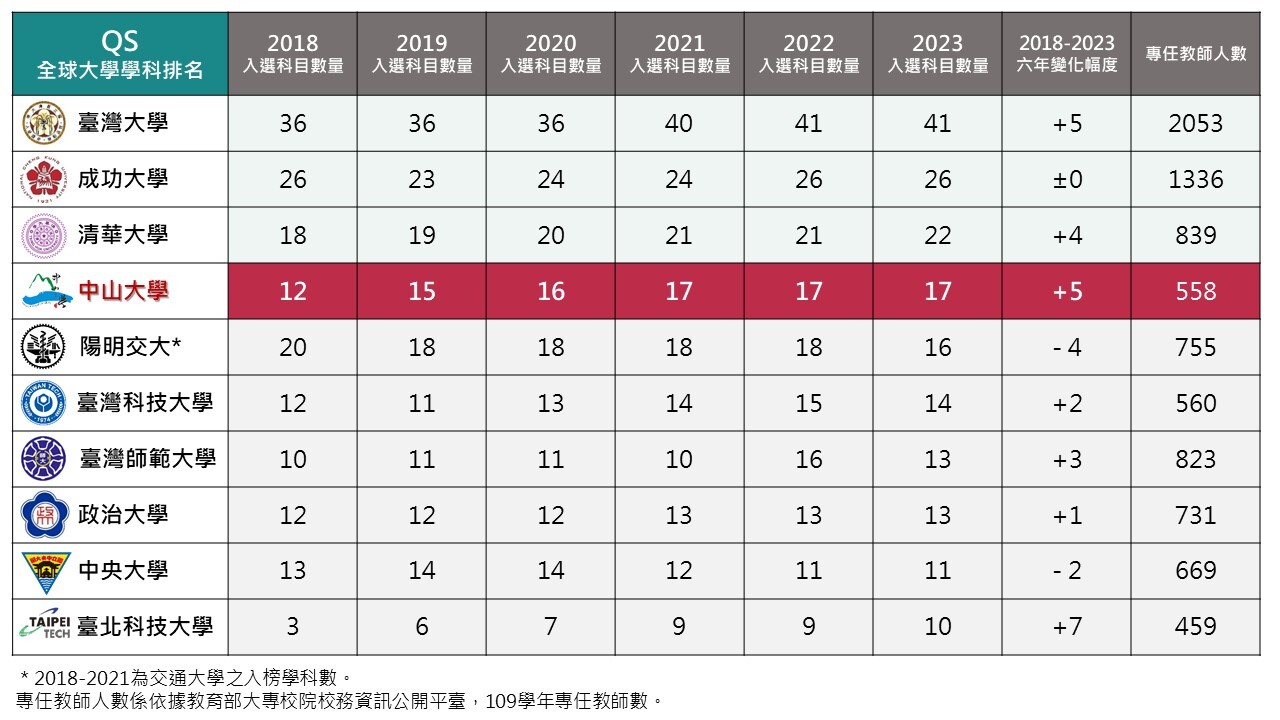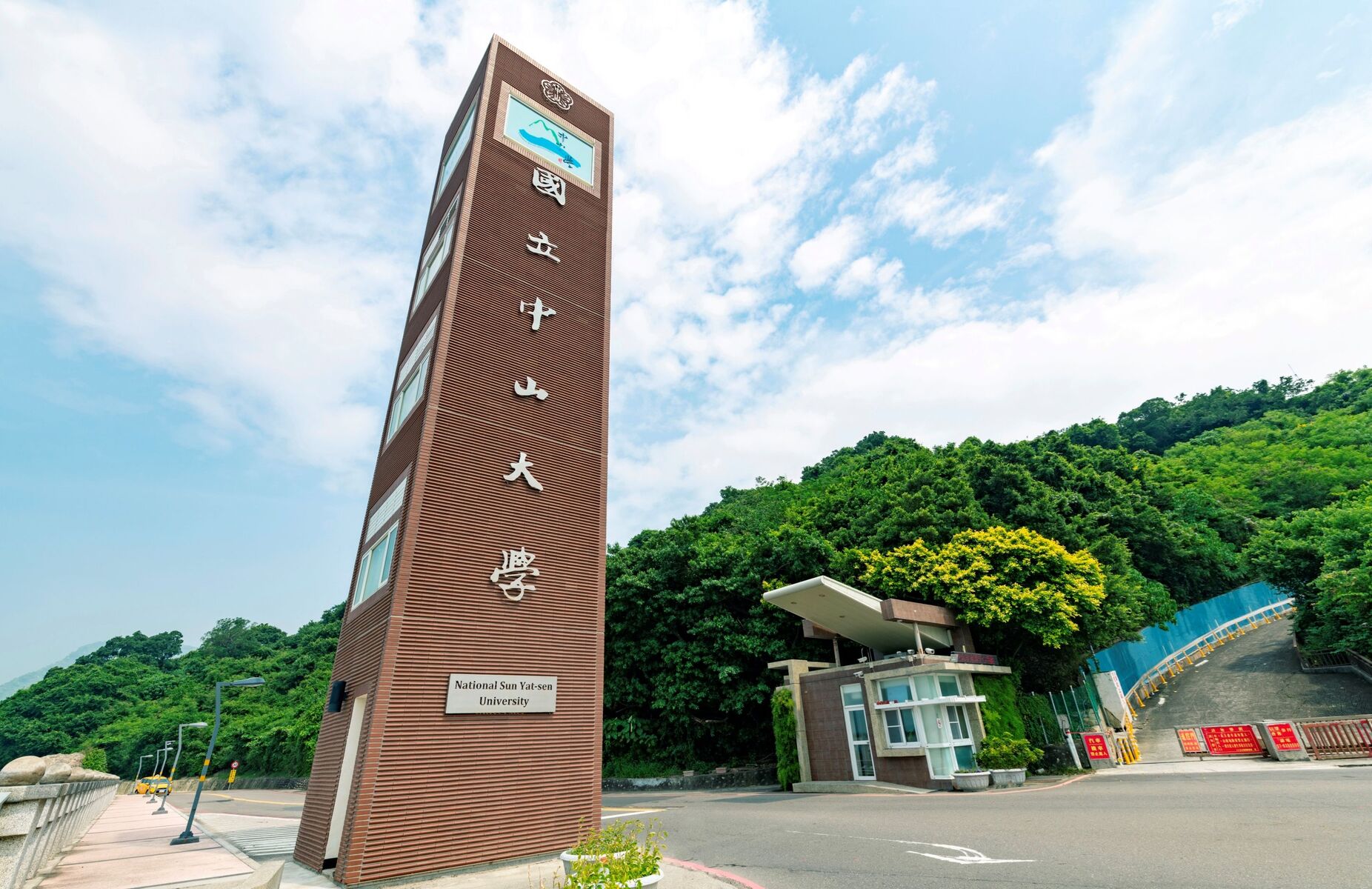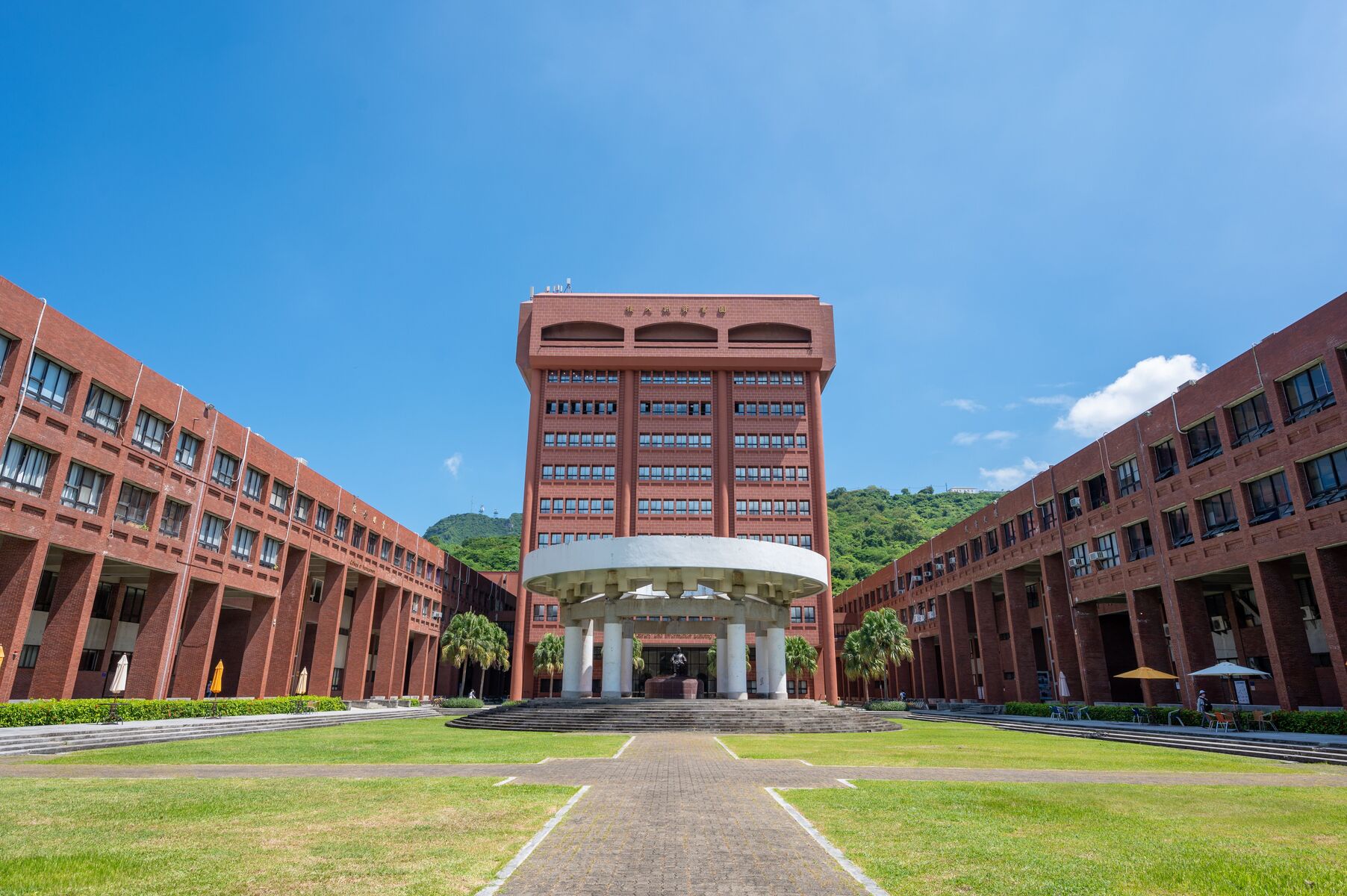NSYSU ranks top four in Taiwan according to the latest QS World University Rankings by Subject



2023-04-20
The British higher education survey agency, Quacquarelli Symonds (QS), has released its latest 2023 World University Rankings by Subject. National Sun Yat-sen University (NSYSU), along with National Taiwan University, National Cheng Kung University, and National Tsing Hua University, are among the top four universities in Taiwan with the most subjects ranked. NSYSU has 17 subjects listed, with Petroleum Engineering remaining in the top 100 in the world, making it the only university in Taiwan to be ranked for this subject.
This year, a total of 1,594 institutions worldwide have at least one subject ranked, and there are 23 universities in Taiwan with subjects ranked. According to Shu-Chen Hsieh, Director of the Office of Institutional Research at NSYSU, the university's "Engineering and Technology," "Natural Sciences," and "Social Sciences and Management" are ranked within the top 500 globally. In particular, the "Social Sciences and Management" field is ranked 363rd globally. In terms of subject rankings, Sun Yat-sen University ranks among the top five in the country for Petroleum Engineering (ranked first), Economics and Econometrics (ranked second), Agriculture and Forestry (ranked third), English Language and Literature (ranked fourth), Accounting and Finance (ranked fourth), Mathematics (ranked fifth), and Education (ranked fifth). Other ranked subjects include Modern Languages, Computer Science and Information Systems, Chemical Engineering, Mechanical Engineering, Electrical and Electronic Engineering, Biological Sciences, Chemistry, Materials Sciences, Physics and Astronomy, Business and Management Studies.
President of NSYSU, Ying-Yao Cheng, emphasized that NSYSU is a delicate research-oriented university that values both humanities and technology. The university was founded 43 years ago and is the youngest among the top ten universities in Taiwan. Although it is relatively small in size, it has achieved outstanding results in all aspects in recent years, with "internationalization" and "uniqueness" as the two main strategies for its development. Its research and teaching achievements are evident. In this year's QS World University Rankings by Subject, there are subjects ranked in all five fields.
"Besides having multiple subjects listed in the science and engineering fields, NSYSU has also performed well in the fields of humanities and arts, as well as social sciences and management." President Ying-Yao Cheng stated that NSYSU's English Literature, Modern Languages, Accounting and Finance, and Education have maintained their ranking within the top 300 globally, while Business and Management studies, as well as Economics and Econometrics, have maintained their position within the top 350. Among them, Accounting and Finance and Economics and Econometrics have both moved up one spot in the domestic rankings. In addition, there are two subjects listed in the Life Sciences and Medicine field, namely Agriculture and Forestry, and Biological Sciences. With the establishment of the College of Semiconductor and Advanced Technology Research, the School of Banking and Finance, and the College of Medicine, NSYSU will be more sophisticated in related subjects just around the corner.
The QS World University Rankings by Subject 2023 evaluates 54 subjects in the five broad fields of "Arts and Humanities," "Engineering and Technology," "Life Sciences and Medicine," "Natural Sciences," and "Social Sciences and Management." The evaluation criteria include Academic Reputation, Employer Reputation, Research citations per paper, and H-index. In addition, the International Research Network (IRN), which was added for the first time last year, is included in some subjects of the three fields of Engineering and Technology, Life Sciences and Medicine, and Natural Sciences this year.
The Academic Reputation and Employer Reputation indicators are based on annual surveys conducted by QS among global academics and employers, who are invited to identify the best universities in their opinions. The Research citations per paper and H-index indicators are based on publications in the Elsevier Scopus database from 2016 to 2020, and the cumulative number of citations received by those papers from 2016 to 2021. The IRN indicator is calculated by analyzing the geographic diversity of research partnerships among institutions, using the Scopus database. Research partners include international higher education institutions that have cooperated on at least three or more papers, and the cumulative citations of these papers (excluding self-citations) are not zero. After counting the countries where these partners are located, the IRN index is calculated by dividing the total number of countries by the number of international partners.
The British higher education survey agency, Quacquarelli Symonds (QS), has released its latest 2023 World University Rankings by Subject. National Sun Yat-sen University (NSYSU), along with National Taiwan University, National Cheng Kung University, and National Tsing Hua University, are among the top four universities in Taiwan with the most subjects ranked. NSYSU has 17 subjects listed, with Petroleum Engineering remaining in the top 100 in the world, making it the only university in Taiwan to be ranked for this subject.
This year, a total of 1,594 institutions worldwide have at least one subject ranked, and there are 23 universities in Taiwan with subjects ranked. According to Shu-Chen Hsieh, Director of the Office of Institutional Research at NSYSU, the university's "Engineering and Technology," "Natural Sciences," and "Social Sciences and Management" are ranked within the top 500 globally. In particular, the "Social Sciences and Management" field is ranked 363rd globally. In terms of subject rankings, Sun Yat-sen University ranks among the top five in the country for Petroleum Engineering (ranked first), Economics and Econometrics (ranked second), Agriculture and Forestry (ranked third), English Language and Literature (ranked fourth), Accounting and Finance (ranked fourth), Mathematics (ranked fifth), and Education (ranked fifth). Other ranked subjects include Modern Languages, Computer Science and Information Systems, Chemical Engineering, Mechanical Engineering, Electrical and Electronic Engineering, Biological Sciences, Chemistry, Materials Sciences, Physics and Astronomy, Business and Management Studies.
President of NSYSU, Ying-Yao Cheng, emphasized that NSYSU is a delicate research-oriented university that values both humanities and technology. The university was founded 43 years ago and is the youngest among the top ten universities in Taiwan. Although it is relatively small in size, it has achieved outstanding results in all aspects in recent years, with "internationalization" and "uniqueness" as the two main strategies for its development. Its research and teaching achievements are evident. In this year's QS World University Rankings by Subject, there are subjects ranked in all five fields.
"Besides having multiple subjects listed in the science and engineering fields, NSYSU has also performed well in the fields of humanities and arts, as well as social sciences and management." President Ying-Yao Cheng stated that NSYSU's English Literature, Modern Languages, Accounting and Finance, and Education have maintained their ranking within the top 300 globally, while Business and Management studies, as well as Economics and Econometrics, have maintained their position within the top 350. Among them, Accounting and Finance and Economics and Econometrics have both moved up one spot in the domestic rankings. In addition, there are two subjects listed in the Life Sciences and Medicine field, namely Agriculture and Forestry, and Biological Sciences. With the establishment of the College of Semiconductor and Advanced Technology Research, the School of Banking and Finance, and the College of Medicine, NSYSU will be more sophisticated in related subjects just around the corner.
The QS World University Rankings by Subject 2023 evaluates 54 subjects in the five broad fields of "Arts and Humanities," "Engineering and Technology," "Life Sciences and Medicine," "Natural Sciences," and "Social Sciences and Management." The evaluation criteria include Academic Reputation, Employer Reputation, Research citations per paper, and H-index. In addition, the International Research Network (IRN), which was added for the first time last year, is included in some subjects of the three fields of Engineering and Technology, Life Sciences and Medicine, and Natural Sciences this year.
The Academic Reputation and Employer Reputation indicators are based on annual surveys conducted by QS among global academics and employers, who are invited to identify the best universities in their opinions. The Research citations per paper and H-index indicators are based on publications in the Elsevier Scopus database from 2016 to 2020, and the cumulative number of citations received by those papers from 2016 to 2021. The IRN indicator is calculated by analyzing the geographic diversity of research partnerships among institutions, using the Scopus database. Research partners include international higher education institutions that have cooperated on at least three or more papers, and the cumulative citations of these papers (excluding self-citations) are not zero. After counting the countries where these partners are located, the IRN index is calculated by dividing the total number of countries by the number of international partners.
Click Num:
Share
